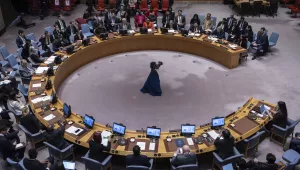The tragic assassination of Benazir Bhutto has engulfed Pakistan in grief and turmoil. But her death symbolizes the wider calamity that envelops us all - throughout the Middle East, Asia, Europe and the United States. The real significance of this killing - and the others sure to follow - is not their surprise, but rather how common, almost inevitable, this sort of event has become in our part of the world. If we wish to end this horror show engulfing more Arab-Asian regions, and increasingly sucking in American and other Western armies, we should get serious about what it means and why it happens.
We should largely dismiss the many exhortations we will now hear about democracy, stability, restraint, terrorism and patience in the face of extremism. These are increasingly vacuous appeals by leaders who willfully ignore a central, miserable reality in which they participate: Much of the vast region from North Africa and the Middle East to South Asia is now routinely defined by political violence as an everyday fact of life.
A telltale sign in Pakistan - as it has been in Lebanon for years, and in many other similarly scarred countries - is that we can identify so many plausible culprits for any incident because so many political people kill on the job - good guys and bad, alike.
Ms. Bhutto, her father and brothers have all been assassinated, as have been successive generations of other political families, in Arab and Asian countries. The lack of novelty of assassination is another telling sign that should clarify for us the wider meaning of this crime, beyond Pakistan. (Try to name even one country in South Asia or the Middle East where no political leader has ever been assassinated.) After grieving for one family and one country, we must react to the chronic nature of political violence by trying to understand the entire phenomenon, rather than its isolated, episodic manifestations.
An honest beginning in this direction would be to acknowledge that political violence does not occur in a historical vacuum. Lone gunmen, local militias, suicide terrorists, state armies, even democratically elected leaders in dozens of countries have all become players in an extensive global drama. On this stage, the use of force is an everyday event - the threat of it is never off the table. It makes little difference whether this is the work of democratic or dictatorial leaders: Dead children and war-ravaged societies do not value such distinctions.
When the military and political violence of democrats and dictators goes on for several generations, social values are distorted and human values are disjointed. It does not matter whetherthis occurs in Pakistan, Egypt, Algeria, Kazakhstan, Northern Ireland or pre-democratic Southern Europe. The absence of credible governance systems based on the rule of law and the equal rights of all citizens slowly pushes citizens and rulers alike to rely on the law of the jungle. They use death and intimidation, rather than electoral or accountable legitimacy, to make their point, to perpetuate their incumbency, to eliminate opponents.
When everyone uses violence and intimidation as routine expressions of their political aims, when terrorists and presidents use firepower to lay down the law, the circle of culpability widens like the ripples from a pebble thrown into a pond. It is becoming harder and harder to tell the difference between gunmen, gangs and governments - in Asia, the Middle East and parts of the West - when the chronic use of violence and lawlessness makes death and assassinations routine, and subsequently inevitable.
We will hear passionate appeals in the next few days about courage, democracy and terror, from presidents, kings and warlords alike. These emperors appear increasingly naked as they exhort us to higher values. It is hard to take them seriously - these Asians, Arabs, Americans, Israelis, Iranians, Turks, Europeans, Africans and anyone else who wishes to stand up and be recognized. These pontificating presidents, kings, and warlords who preach about life and democracy have spent a generation sending their armies to war, overthrowing regimes, authorizing assassinations, arming gangs, trading weapons for political favours, buying protection from thugs, cozying up to terrorists, lauding autocrats, making deals with dictators, imprisoning foes, torturing at will, thumbing their nose at the UN Charter, buying and bullying judges, ignoring true democrats and blindly refusing even to hear the simple demands of their own citizens for minimum decency and dignity.
I have spent my entire adult life in the Middle East - since the 1970s - watching leaders be assassinated, foreign armies topple governments, local colonels seize power, foreign occupations persist for decades, the rule of law get thrown in the garbage, constitutions be ignored and, in the end, ordinary people finally decide they will not remain outside of history or invisible in their own societies.
Instead, they decide to write themselves into the violent scripts. They kill, as they have been killed. Having been dehumanized in turn, they will embrace inhumanity and brutality.
Who killed Benazir Bhutto? We all killed her, in East and West, Orient and Occident, North and South. We of the globalized beastly generation that transformed political violence from an occasional crime to an ideology and an addiction.
Rami Khouri is director of the Issam Fares Institute at the American University of Beirut, at-large editor of the Beirut-based Daily Star
Khouri, Rami. “Who Killed Benazir Bhutto? We All Did.” Globe and Mail, December 29, 2007
The full text of this publication is available via Globe and Mail.




